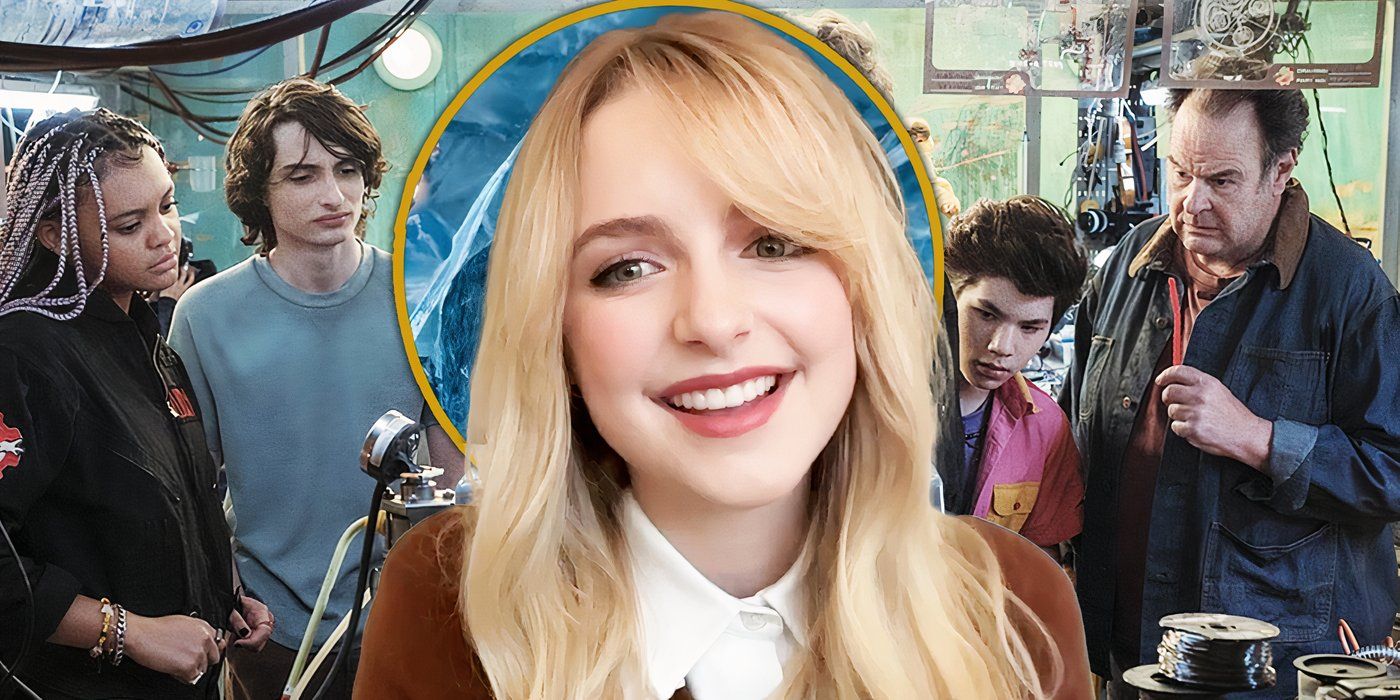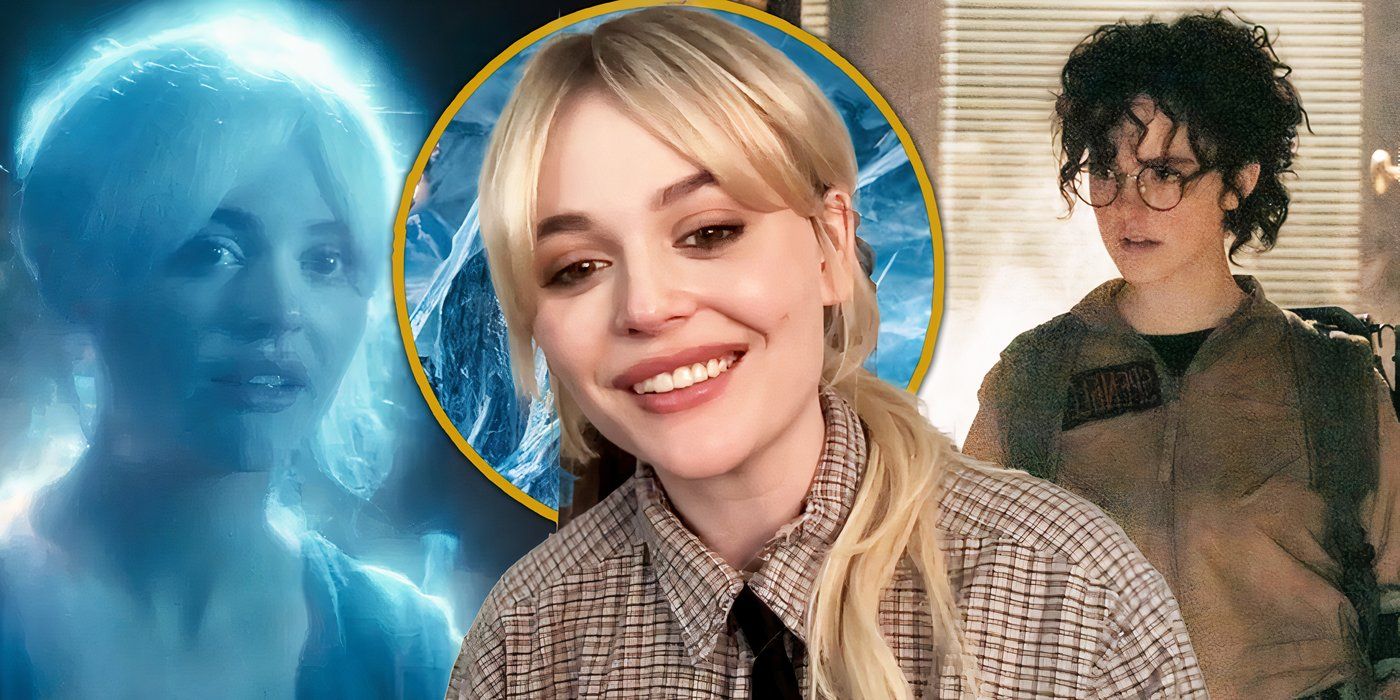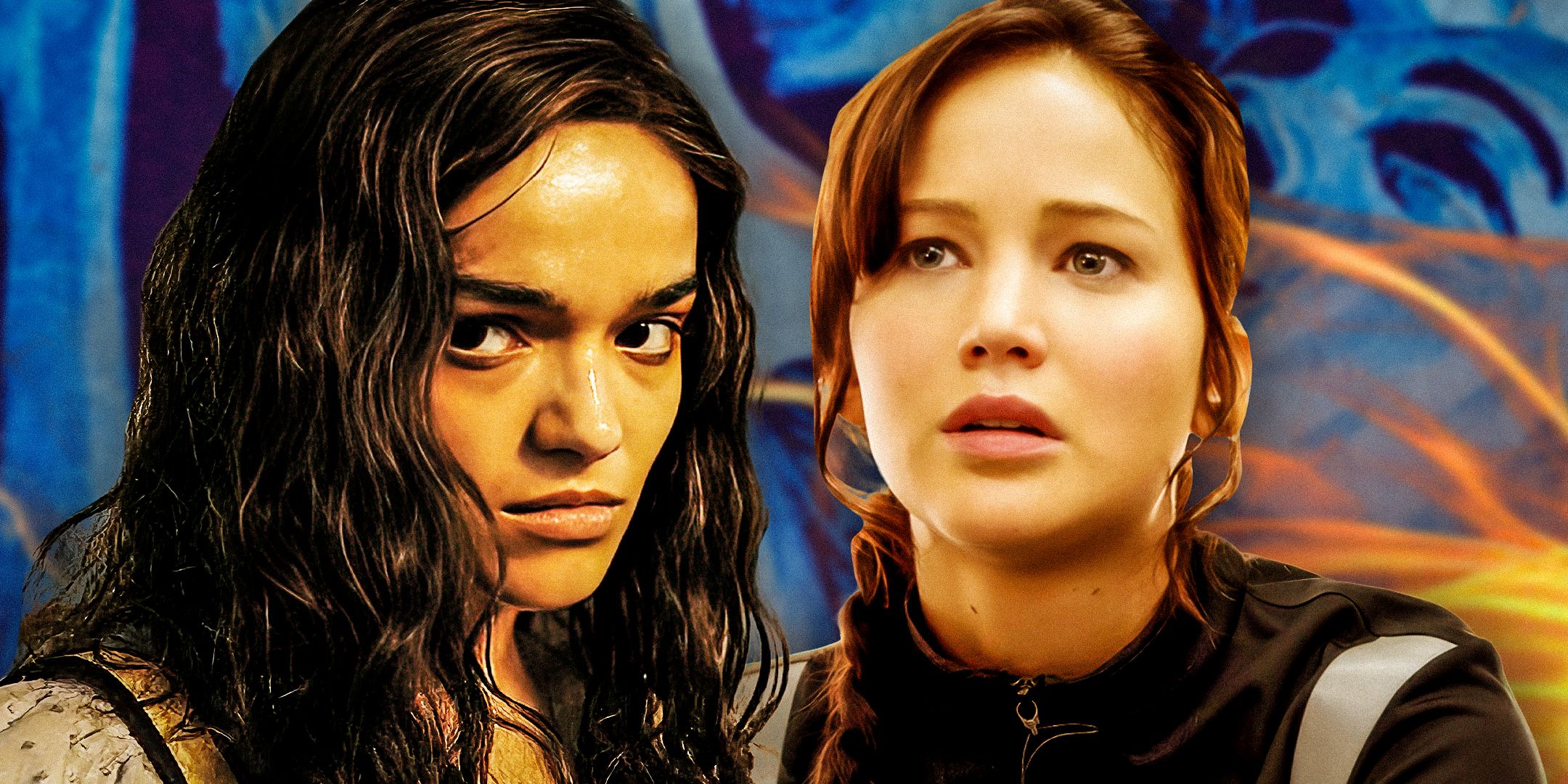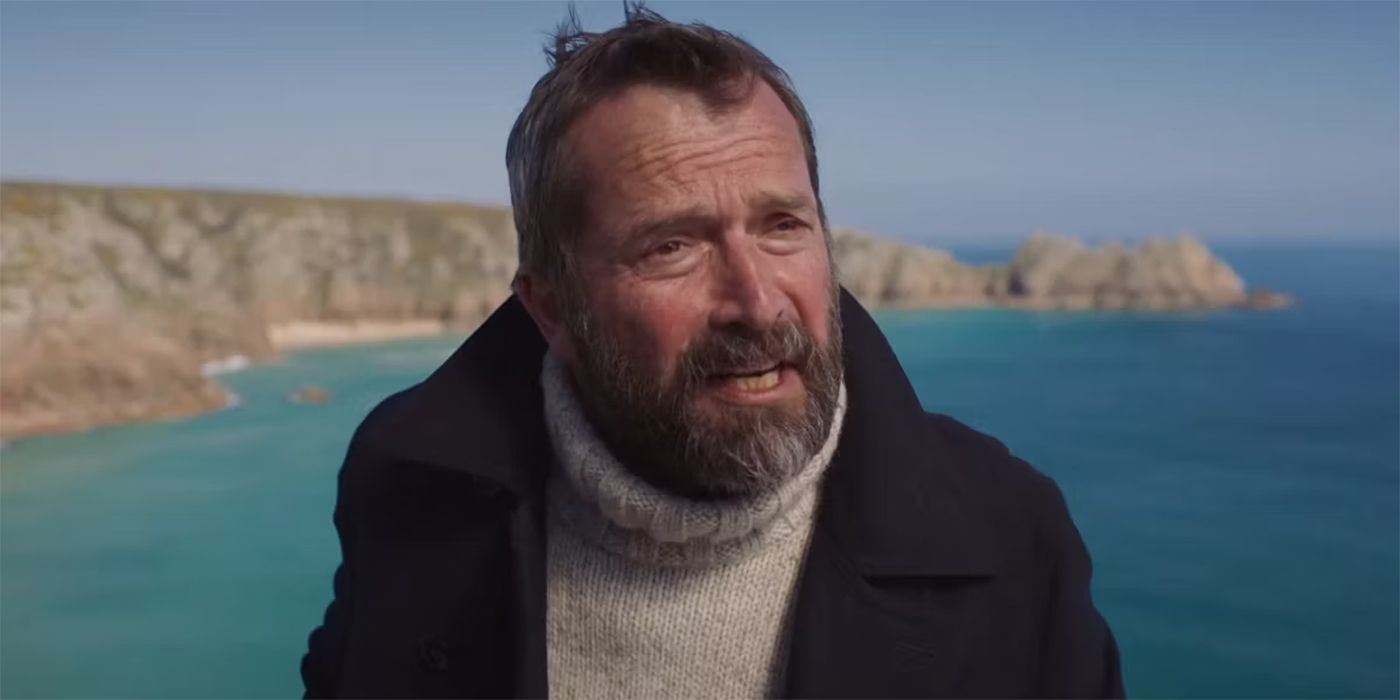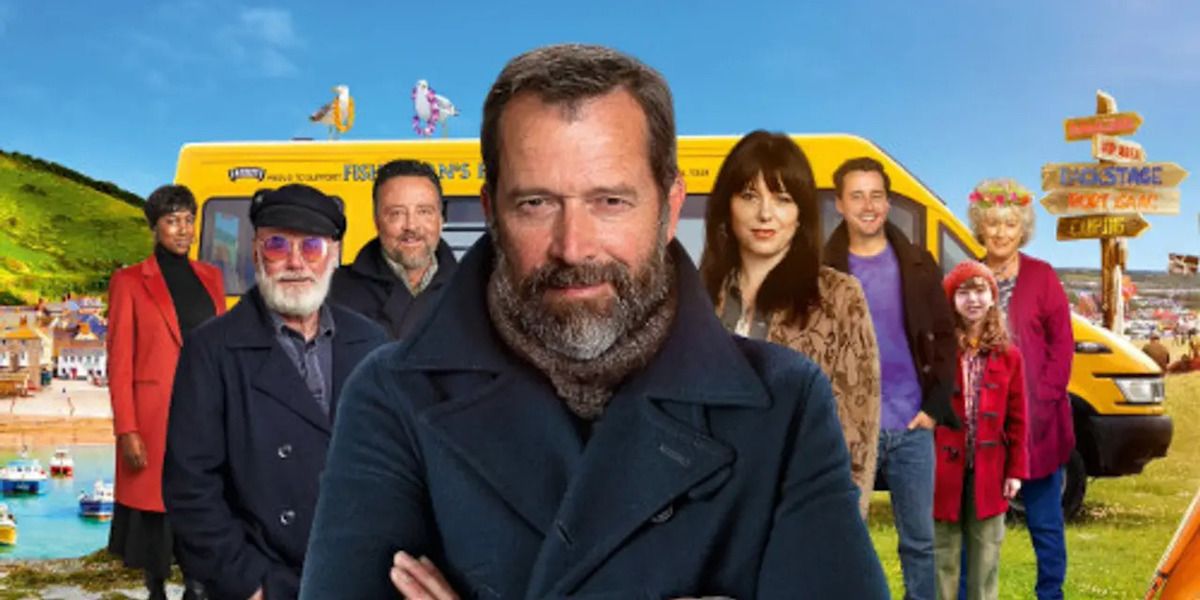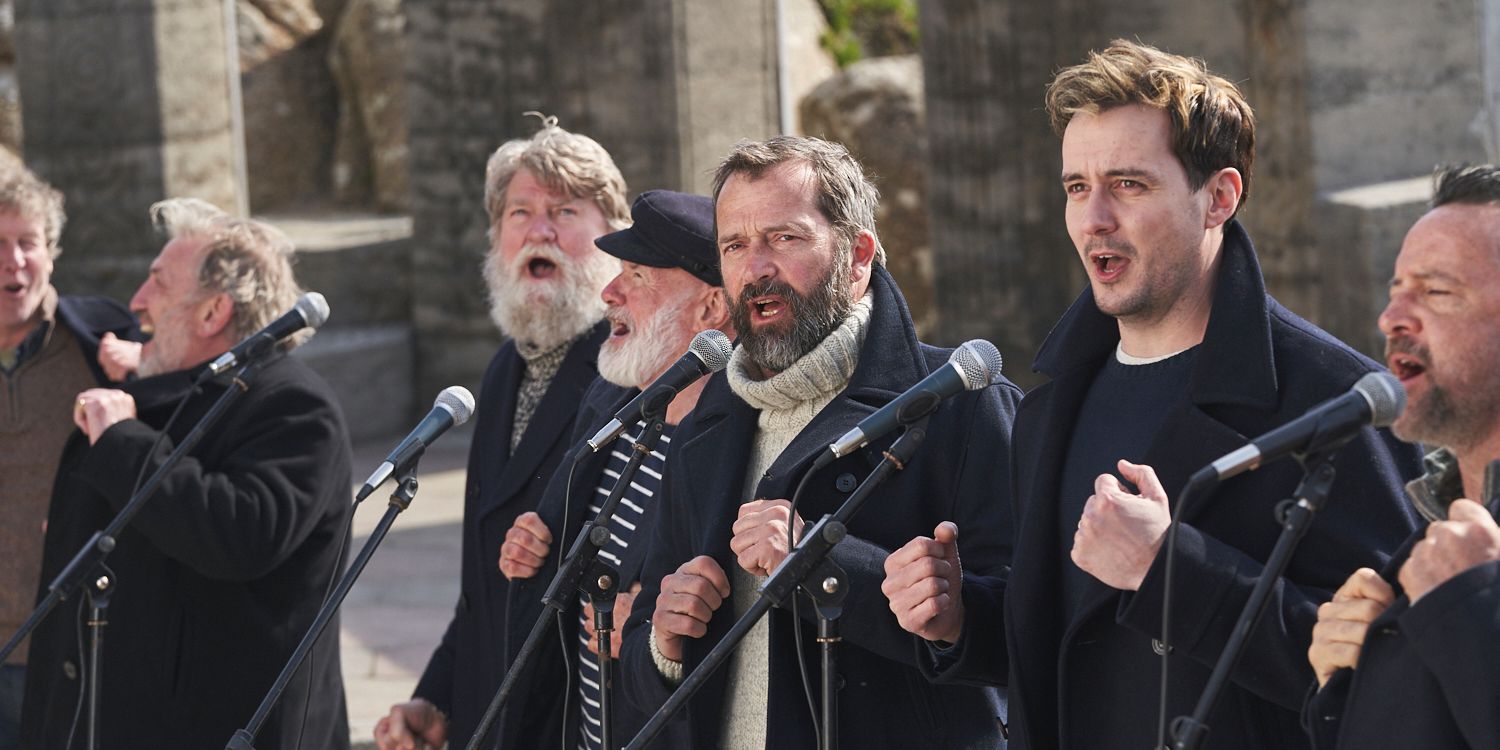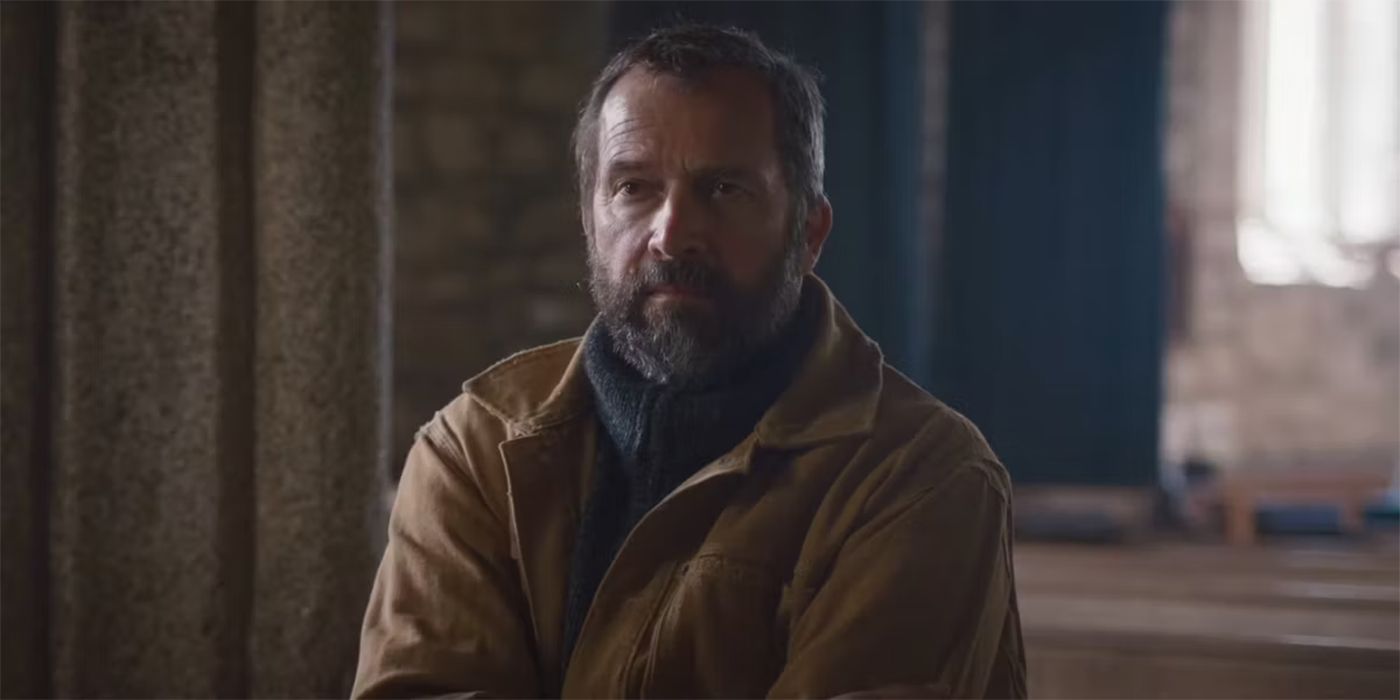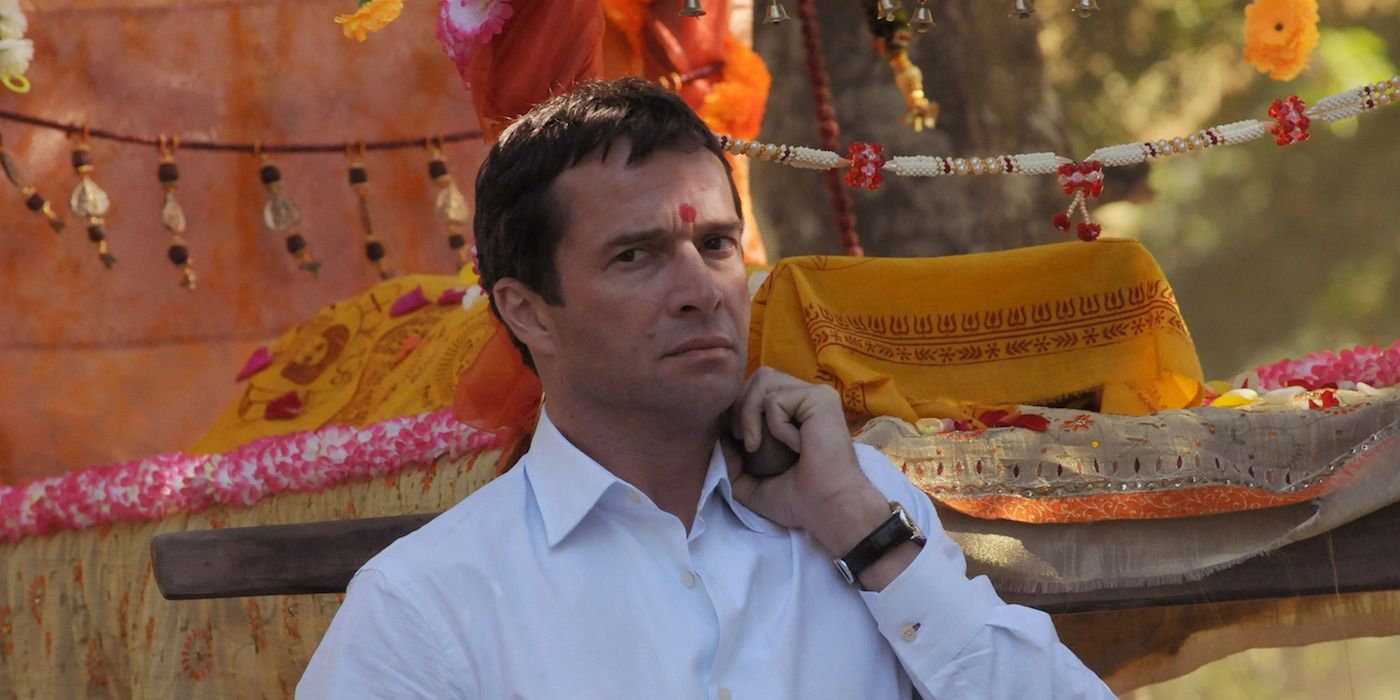Released in 2019, Fisherman's Friends tells the unlikely true story of a group of Cornwall-bred fishermen who became pop stars thanks to their soulful renditions of traditional British sea shanties. The film was successful enough to garner a sequel, Fisherman's Friends: One and All, which tells a fictionalized version of the band's quest to play at the legendary Glastonbury Festival.
Fisherman's Friends: One and All sees many of the original cast returning to reprise their roles, including leading man James Purefoy as Jim, whose pride and masculine posturing clouds his ability to confront the grief he feels over the death of his father (David Hayman) during the events of the original film. When the record label demands that the band hire a replacement to fill his late father's shoes, Jim turns to alcohol and self-destruction while giving into his depression. While essentially a jolly comedy with amazing musical performances set amidst beautiful vistas of Port Isaac, there's a palpable beating heart at the center of the story that elevates it above and beyond traditional sequel fare.
While promoting the release of Fisherman's Friends: One and All, James Purefoy spoke to Screen Rant about his work on the film, including the original plans to shoot scenes at the actual Glastonbury music festival; sadly, those plans were canceled due to the unprecedented Coronavirus pandemic. The erstwhile star of The Following talks about the new movie's themes of male depression and the sheer walls of toxic masculinity that prevent many men from seeking the help they need. Finally, he talks about that time Milla Jovovich hit him in the head with an axe on the set of 2002's Resident Evil, though he harbors no ill will towards his former co-star... At least, not anymore.
James Purefoy on Fisherman's Friends: One And All
Screen Rant: I watched both movies back to back. I watched Fisherman's Friends and the new movie, Fisherman's Friends: One and All, and I had a great time!
James Purefoy: That's very impressive!
I've always had a little bit of an Ishmael Syndrome, of wanting to go on a boat for months at a time, but boy-oh-boy, now I kinda wanna just quit my job, drop everything, and become a fisherman.
James Purefoy: A sea shanty-singing fisherman! Yes, well, you know, they have extraordinary lives. But it's a lot of loneliness. There was a lad down there who... The yellow boat that we have, he goes out all the time. It's out on the sea for eight or ten hours at a time, and you're alone. That's something you do every single day, weather permitting. They're not softies. [Laughs] They're hard!
How were your sea legs? Quite a bit of the movie is shot on these beautiful fishing boats. Did you have any experience on the water before you did these movies?
I've always had good sea legs. On the first movie, we were shooting a scene one day, and the sea was quite choppy. And the boom operator, she was so professional. She was terribly sick, but she would only vomit between sentences.
She'd hold it until the full stop, and then chuck up, and then you'd be able to carry on again. But she'd never overlap with your lines. It was kind of remarkable! She was a true professional.
She had a weak, but considerate, stomach.
James Purefoy: Indeed. But my sea legs are fine. I've never had a problem with it. I've been out on boats a lot in my life.
If you're into it, it must be a dream come true getting to make a movie out there.
James Purefoy: Yes. I like the lobsters, I like the cages, I like... I even like the baiting of the cages with the pilchards. That's pretty grim stuff and you get that sh*t all over you. You're constantly finding scales in your hair and all that kind of stuff when you come home.
One and All still has an ensemble cast like the first movie, but it feels much more focused on your story. You're the lead, this is your movie, and you get to really shine in it.
James Purefoy: Yeah, I guess so. That's probably true, I hadn't thought of it like that. I think what happened was, when they first came to me and said they wanted to do another one since the first one made money, I asked, "Where's the story? What more can we say?" Because I don't want to flog a dead horse. I wanted it to be something new and fresh. I wanted their thoughts. They said, firstly, the band ends up at Glastonbury, and that's a big deal. So I said, "How would that work?" And the plan was to shoot at Glastonbury.
Woah.
James Purefoy: Bear in mind, I come from Somerset, in England, where Glastonbury is. It's 20 minutes up the road from me. It's a big deal globally, but it's a really big deal in Somerset. The idea that I would get to play that main stage, the Pyramid stage at Glastonbury... I'm not going to pretend that I'm cool enough to go, "Yeah, whatever." I really fancied that. I really did. They said, "We'll probably get 15 minutes. They've given us 15 minutes between sets, we'll sing the song one or two times, as many times as we can. We'll cover it with five or six cameras. So I said yes, based on that pitch. And then Covid happened. The pandemic hit. Glastonbury wasn't happening that year. It got cancelled. So we had to mock it up.
Oh, that's too bad.
James Purefoy: But by then, when we were shooting, I was already in it, and we discovered other thins. They asked me, what interests you about these people? And I said, one thing that's interesting to me is male depression. Can we get male depression into a film that's ostensibly a feel-good rom-com light and frothy piece? And they said, "I think we can work on that." So we worked on the storyline of him finding it really difficult to deal with his father dying.
And the more I looked into male depression, the more the stats jumped out at me. Five times more men take their lives because of depression than women. They often do it in a much more violent way, too. For obvious reasons, in 2022, many men feel like they can't talk to people. They bottle it down. They keep it down. Because they don't articulate their feelings about things, it can often end in tragedy.
The film definitely gets heavy with those themes, yes.
James Purefoy: We talked a lot about that as a central tenet. And we build around it, with the songs and the gags, but you keep coming back to Jim and how he's dealing. He's dealing badly with fame, but he's not really dealing badly with fame; he's not dealing with the grief that's underneath. And I wanted to talk about the fact that, with depression, so many people do take their own lives because they don't think it's ever going to end. I wanted to say, "No, it can end. And it does end. Depression can end."
For lots of people, the skies are dark and roiling. But there's often a little blue patch, and you should be able to look at that blue patch and realize, it's going to clear. The sky will clear up at some point. Just make it to the end of the day. Get to bed, and tomorrow might be different. I think that's what happens with Jim. It does clear. His depression is bad, but it can clear. With the love of a good woman, who teases out information from him, and stuff about his dad, he starts talking and opening up. And once he does, the weight falls off your shoulders a little bit. And the more weight that falls off your shoulders, the more you can achieve, until they end up playing Glastonbury! He's not going to be 100% happy, but 65%, or 70% will do for now!
As long as there's something on the horizon to look forward to.
James Purefoy: Exactly. Things can change. Things do change. I'm a passionate gardener. I have a lovely garden here at home, and I like gardening. Even when the garden looks like s--t, like it does at this time of year, I'm already excited about the Spring. I'm excited about the amassing of energy that happens under the soil of the garden. Come Spring, everything starts bursting forward again! You can always look at a plant and go, "That doesn't work there." Okay, so move it!
Gardening is a little bit of a thing for me. It's a metaphor for life. You can move things around. Maybe that doesn't work there for a good reason. Maybe it works better over there underneath that tree where it's a bit more shaded. You can keep changing things. I think you can keep changing things in your life. You can find ways through. It's a call to arms for male depressives. Things can get better. You know, it doesn't get better if you're dead.
Exactly. I wish I could have watched this movie with my father, who passed away a couple of years ago from cancer. I'm almost entirely sure he was depressive.
James Purefoy: Oh, I'm sorry. Would he talk about it? Or did he keep it to himself?
There was definitely the masculine wall that was up. He was a working-class guy, a New York City bus driver... He was basically Jackie Gleason.
James Purefoy: Right, right (Laughs)
But there were definitely breakthroughs. At the time, they felt like maybe they were a bit too late to matter. But now that he's gone, I've learned to appreciate the importance of those moments.
James Purefoy: But they happened. And thank God they happened, rather than didn't happen. That's the point, isn't it?
Yes. It feels like we were able to turn those pages.
James Purefoy: My dad died about three weeks before we started shooting the movie. I only buried him about a week before we started. So to go into a film where the leading character is suffering from the depression of his father having died, when my own father had just died... Although our situations were different, the same basic thing had happened to us both. The difficulty with that, for me, was that Jim's journey was a year in the making. But mine had only happened a week ago! I was really fresh to the world of grief from my father dying. It's such a body-slamming event. You can imagine that it can happen, but when it does happen...
Somebody told me it's like being hit by a wave over and over. Sometimes you think you're going to drown from that wave. But every time that wave happens, you stand up again. Slowly but surely, you realize that the wave isn't going to kill you. It's gonna keep hitting you, but sometimes you're able to actually keep standing as the wave washes over you, rather than be knocked sideways by it. And time has its own time, doesn't it? You can't rush it. And grief really takes time.
Time does its own thing. You can't rush it. It takes a long time... And that's the other thing. We were shooting this at the time of the pandemic, so it was at the forefront of a lot of people's minds that a lot of people have died recently, and a lot of people are dealing with that. So one of the things we wanted to do was to make people feel less alone about a relative's death. That's one of the great things about movies and theater and TV, it can make you feel less alone in the world. You can watch people go through things that you're going through. You thought you were going through this thing on your own, but there's a character right in front of you who is going through the same thing! It's part of the glue that keeps us all together, this art that we do.
That's why we have to take it really seriously, because that glue is really delicate sometimes. I was really grateful to do that in a film, and whatever anyone else thinks of it, I know what the intention of it was. I know that other people... I've had blokes stopping me outside of car parks in supermarkets all the time now, especially around here, they go, "I saw that film of yours, and it made me think of my father. So thank you." And it's just nice.
Incredible! It's a feel-good movie, but with real meat on its bones.
James Purefoy: It's a form of social work in what we do, sometimes. Sometimes. Not in every job I've ever done! But every once it a while, a job comes along where it feels like you're doing something good.
Definitely. Okay, let's switch gears now. This is the feature film debut of the lovely and talented Imelda May...
James Purefoy: This is not going to be the last time you see her in a movie, either!
She was fantastic!
James Purefoy: We wanted a rock star. We wanted someone who could sing. And Imelda has this slightly anarchic and beautiful streak in her. She understands fame and what that's like. She has a big following here. I don't know if you've heard of her over there, but she's a really great singer. It's a frustrating thing as an actor, where you spend so many years training, and going to so many classes, and then someone walks up and they can just do it totally naturally. And you go, "all of my teachers are frauds!" [Laughs] If you've got talent, you can just do it.
There's a bunch of different paths one can take to get to the movies.
James Purefoy:Yes. I know we're going to be seeing a lot more of Imelda May on screen. She's an awesome woman and someone I'm really fond of and admire greatly. I think she's terrific.
I've got a little piece of Hollywood history that I've been wondering about for the better part of two decades. In Resident Evil, did Milla Jovovich really hit you really hard in the back with an axe?
James Purefoy: It was on the head.
On the DVD commentary, she's like, "Yeah, I hit James really hard."
James Purefoy: You can read into that what you will. But what you will might well be right! [Laughs] Yeah... She hit me hard. With the axe. On the head, having been told not to hit me on the head with the axe.
She was very much still in her learning days as an action heroine, and maybe wasn't quite as accurate as she thought she might be.
What's the next thing we're going to see you in?
James Purefoy: The next thing you'll probably see me in is Marie Antoinette, which is on PBS in January or February of next year. I'm playing Louis XV. That's a part, believe you me.
Ooh, interesting.
James Purefoy: He's quite the... If I was to say he was a sex addict, I think I'd be painting him lightly. He was certainly somebody who liked a 'rumpy pumpy' well into his later life.
I can't wait to see it. Finally, one last thing... Before The Following, I watched you on a short-lived program called The Philanthropist.
James Purefoy: Ah, yes... You could never get that show made now, though! No way, sir. A big 'white savior' diving in to help impoverished people in the third world? No, that would not happen anymore. [Laughs]
Did you take it personally, the idea of a show called The Philanthropist getting canceled right away, but The Following, where you play a serial killer...
James Purefoy: I played a serial killer, and we did three seasons! (Laughs)
Exactly. Do you take that personally?
James Purefoy: I think it says more about the American tastes than it does about my own. (Laughs)
Fair enough!
Fisherman's Friends: One and All releases in theaters and on Digital on November 18.


